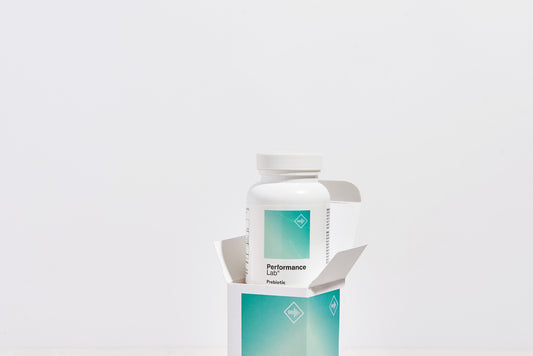If you've ever struggled with bad gas, bloating, constipation, or any other digestive symptoms, you've probably been told to eat more fiber.
Millions of people complain about gastrointestinal distress. And while getting enough fiber may seem like an easy task, the reality is that most people don't come close to the recommended dietary intake.
Anyone following low carb or keto diets will know that many high-fiber foods like lentils, chickpeas and oats, are also high in carbs.
But dietary fiber offers a goldmine of health benefits. So what are we supposed to do?
Whether you're looking to lose weight, improve heart health, or support healthier digestive performance, fiber is where it's at.
And if you're on a low carb diet, or living the keto lifestyle, how do you get enough fiber?
Right now, we're diving into the details about what fiber is and why you need it, plus our favorite low-carb fiber supplement.
What You Need To Know About Fiber

When fiber comes up, the first thing most people think about is bowel movements. Yeah, fiber is one of the compounds your body requires for smooth moves.
But it's so much more than that. It's involved in everything from optimal brain function and heart health to immune responses and even weight management.
But fiber isn't as straightforward as just indigestible plant material. You may have heard about soluble and insoluble fiber, but here we're breaking down the ins and outs of another fiber you may not have heard about—prebiotic fiber.
Probiotic vs. Prebiotic
We hear a lot about probiotics and their beneficial effects on immune function and digestive health, but there's a lot of confusion between PRObiotics and PREbiotics.
The former are “live microorganisms that, when administered in adequate amounts, confer a health benefit on the host”(1). The benefits that probiotics have to offer differ between strains.
For example, Lactobacillus species naturally inhabit the small intestine and are beneficial for supporting the integrity of the gut barrier, bowel function, and immunity. Bifidobacterium, on the other hand, are populous in the large intestine and support digestion, mood, and stress response.

Prebiotics, on the other hand, aren't live organisms per se, but rather the food supply that beneficial bacteria thrive on.
Like humans, the good gut bugs require fuel to function, and if you're not giving them prebiotic fiber (i.e. their food source), they will die. These prebiotics are selectively used by host microorganisms and, as a result, can manipulate host microbiota composition.(2)
Essentially, prebiotics are different types of complex carbohydrates. And because the body doesn't have the enzymes needed to break them down, the microbes in your gut metabolize them and produce short-chain fatty acids (SCFAs) like acetate, propionate, and butyrate(3). All of which confer their own health benefits.

While prebiotics can be found in supplemental form, they're also widely available in isolated carbohydrates and carbohydrate-containing foods like polydextrose, wheat dextrin, acacia gum, psyllium, banana, whole grain wheat, and whole-grain corn.(4)
6 Health Benefits of Fiber
1. Improves Gut Health And Digestive Performance

The gut is the center of your body, and although it's where all digestion happens, the gut is about more than just digestive performance. It's home to thousands of different bacterial species—some good, some bad—that work symbiotically to keep you healthy.
You provide shelter, food, and a safe environment for the bacteria, and, in turn, they offer a range of different health benefits like weight control, blood sugar regulation, immune health, brain health, and so much more.(5-8)
But here's the thing, unless you're loading up on fiber, most of the food for these little guys is gone by the time it reaches your large intestine, meaning they have no fuel to flourish. This is where fiber is important.
Because enzymes can't digest fiber, it reaches your colon intact and functions as a prebiotic to feed the beneficial bacteria in your gut, helping to maintain a balance between good and bad(9). These friendly bacteria then produce short-chain fatty acids (SCFAs) that offer many other health benefits.(10)
2. Supports Bowel Health

People don't like to talk about poop, but healthy bowel movements are critical to overall health and well-being. Believe it or not, constipation is more common than you think, with anywhere from 12% to 19% of Americans struggling with symptoms and affecting females more than twice as much as males.(11)
Fiber is so beneficial for the bowel because insoluble fiber acts as a bulking agent to increase stool size while also acting like a brush to sweep through your bowels, clear everything out, and keep it moving.
Soluble fiber, on the other hand, absorbs water to form a gelatinous, viscous substance that is fermented by bacteria in the gut to soften stools, keep them moving smoothly, and improve form and consistency(12)
Regular bowel movements are not only important to remove toxins, bacteria, and excess hormones from your body, but also help to reduce the risk of hemorrhages, anal fissures, impaction, and infection. Not to mention that chronic constipation can lead to major blockages, pain, and discomfort—and who wants that?

Did you know: Chia seeds are a high fiber keto food, providing 10g of fiber per two tablespoons. They consist of both soluble and insoluble fiber, with the vast majority (85-93%) being insoluble. This balance means they not only have a high fiber content, they also have water retaining properties, so they act as a natural laxative.
3. Helps Regulate Blood Sugar

The massive highs and lows in blood sugar that come along with a diet high in refined carbs and sugar can be detrimental to both your physical and mental state. Blood sugar dysregulation is a common risk factor for diabetes, metabolic syndrome, and many other health conditions.
While the mechanisms by which dietary fiber exerts its hypoglycemic and hypolipidemic activities aren't apparent, researchers believe it has something to do with the high viscosity fibers like b-glucan, psyllium, and raw guar gum.
But regardless of the mechanism, studies do point to the role of a high-fiber diet in mitigating blood sugar and insulin imbalances.(13, 14)

Did you know: Avocados may support better blood sugar control. Especially for those with type 2 diabetes. Research shows they're linked to lower fasting glucose and HbA1c levels ( a key marker of long-term blood sugar balance) and improved insulin response.(15)
4. Supports Cardiovascular Health

While several factors can lead to poor cardiovascular health and an increased risk of atherosclerosis, heart disease, and stroke, how much fiber you're eating could be a major one.
Studies show that high intakes of dietary fiber are associated with significantly lower rates for coronary heart disease (CHD), stroke, and peripheral vascular disease(12). Major cardiovascular risk factors, including hypertension, diabetes, obesity, and dyslipidemia, are also much less common in people with high fiber consumption.
While the effect may not be as big as you'd expect, soluble or viscous fibers have significant hypocholesterolemic effects that can help to reduce LDL (bad) cholesterol levels(12, 16). In the gut, soluble fibers bind to cholesterol from foods with bile, which helps to limit cholesterol absorption and encourage its elimination.
5. May Support Weight Loss

We've all heard people say that if you want to lose weight, increase your fiber intake—and it's true. When combined with a healthy diet and lifestyle, boosting your fiber intake has many benefits for weight management, including suppression of hunger hormones, appetite control, reducing caloric content of foods, and mitigating blood sugar spikes that can lead to fat storage.
Here's why.
- Inulin-FOS's ability to absorb water and swell in the stomach slows the digestion process to reduce appetite and promote appetite control
- Taking inulin may help reduce triglycerides—the building blocks of fatty tissues linked with weight gain and cardiovascular issues
- Inulin-FOS may reduce food intake by suppressing the hunger hormone ghrelin and supporting increased secretion of the satiety hormone, peptide YY
- Soluble fiber slows food transit time in the gut, which in turn reduces glycemic load and regulates blood sugar spikes
Related Post: Inulin Weight Loss: Can It Really Help You Drop Those Pounds?
6. Healthier Immune System

Did you know that more than 70% of your immune system resides in your gut? If you're not housing a healthy and balanced environment in there, your immune system isn't going to be healthy and balanced either.
There's a large body of evidence that suggests fermentable dietary fibers and prebiotics can modulate several aspects of the immune system, including those of the gut-associated lymphoid tissues (GALT)(17)
Alterations in intestinal microflora that happen by consuming prebiotic fibers have the potential to mediate immune function by a few different mechanisms:
- Direct contact of lactic acid bacteria or bacterial products with immune cells in the intestine
- Production of SCFAs from fiber fermentation
- Changes in mucin production
Another interesting discovery was made in a study published in Brain, Behavior, and Immunity suggesting that soluble fiber can shift the behavior of immune cells—going from pro-inflammatory cells to anti-inflammatory cells that support healing and recovery—due to increased production of an anti-inflammatory protein called interleukin-4, which helps to build up and strengthen the immune system(18).
Best Low-Carb Fiber Supplement For 2025: Performance Lab® Prebiotic
Eating a colorful and varied diet rich in prebiotics and probiotics is always the best strategy. But if you're not consistently able to do that, or you're on low carb or keto friendly eating plan, supplements will help bridge any gaps.
There's still a lot of ongoing research when it comes to probiotic supplements. As a consumer you want to know that what you are investing in, is doing the job you need it to do.
Which is where Performance Lab® Prebiotic—comes into its own.

Rather than adding dozens of new bacterial strains to your gut, Prebiotic is the best fiber supplement to nourish your existing probiotic colony with Orafti® Synergy1 (Inulin-FOS from chicory root) for robust growth and health.
If you've found a reliable probiotic, fantastic. Maximize those colony forming units by feeding them a great prebiotic.
Performance Lab® Prebiotic supplies an advanced, organic upgrade on standard probiotic supplements by feeding your gut's existing microflora to promote the healthy growth of beneficial bacteria in harmony with your body.
Prebiotic delivers more reliable, natural, and comfortable support for digestion, immune function and weight loss.
Benefits
- Supports digestive regularity, gut comfort, and efficient nutrient absorption
- Promotes healthy immune system performance in the GI tract
- Nourishes existing gut microbiome rather than introducing new probiotic strains
- May support fat loss by helping to control appetite
- Supports heart health by regulating bad cholesterol absorption
- Supports bone health by enhancing calcium absorption
Key features
- Inulin-FOS (as Orafti® Synergy1)
- FructoOligoSaccharides from Chicory Root
Shop Performance Lab® Prebiotic
Final Thoughts
Increasing your fiber intake doesn't have to be rocket science—it can be as simple as making a conscious effort to eat more fruits and vegetables.
But if you want to guarantee that you're feeding the beneficial bacteria and allowing them to proliferate to reap all of their health benefits, there's only one choice— Performance Lab® Prebiotic. It's ultra-clean, super-effective, and a no-brainer for overall health and well-being
- C Hill, F Guarner, G Reid, et al. Expert consensus document. The International Scientific Association for Probiotics and Prebiotics consensus statement on the scope and appropriate use of the term probiotic. Nat Rev Gastroenterol Hepatol. 2014;11(8):506-514.
- GR Gibson, R Hutkins, ME Sanders, SL Prescott, RA Reimer, SJ Salminen, et al. Expert consensus document: The International Scientific Association for Probiotics and Prebiotics (ISAPP) consensus statement on the definition and scope of prebiotics. Nat Rev Gastroenterol Hepatol 2017;14:491-502.
- HD Holscher. Dietary fiber and prebiotics and the gastrointestinal microbiota.Gut Microbes. 2017;8(2):172-184.
- J Slavin. Fiber and prebiotics: mechanisms and health benefits. 2013;5(4):1417-1435.
- F Guarner, JR Gut flora in health and disease.Lancet. 2003;361(9356):512-519.
- RE Ley, PJ Turnbaugh, S Klein, JI Gordon. Microbial ecology: human gut microbes associated with obesity. 2006;444(7122):1022-1023.
- G Musso, R Gambino, M Cassader. Obesity, diabetes, and gut microbiota: the hygiene hypothesis expanded?.Diabetes Care. 2010;33(10):2277-2284.
- HJ Wu, E Wu. The role of gut microbiota in immune homeostasis and autoimmunity.Gut Microbes. 2012;3(1):4-14.
- JA Parnell, RA Reimer. Prebiotic fiber modulation of the gut microbiota improves risk factors for obesity and the metabolic syndrome.Gut Microbes. 2012;3(1):29-34.
- JM Wong, R de Souza, CW Kendall, A Emam, DJ Jenkins. Colonic health: fermentation and short chain fatty acids.J Clin Gastroenterol. 2006;40(3):235-243.
- PD Higgins, JF Johanson. Epidemiology of constipation in North America: a systematic review. Am J Gastroenterol. 2004;99(4):750-759.
- JW Anderson, P Baird, RH Davis Jr, et al. Health benefits of dietary fiber.Nutr Rev. 2009;67(4):188-205.
- G Riccardi, AA Effects of dietary fiber and carbohydrate on glucose and lipoprotein metabolism in diabetic patients.Diabetes Care. 1991;14(12):1115-1125.
- JW McRorie Jr, NM McKeown. Understanding the Physics of Functional Fibers in theGastrointestinal Tract: An Evidence-Based Approach to Resolving Enduring Misconceptions about Insoluble and Soluble Fiber.J Acad Nutr Diet. 2017;117(2):251-264.
- Senn MK, Goodarzi MO, Ramesh G, Allison MA, Graff M, Young KL, Talavera GA, McClain AC, Garcia TP, Rotter JI, Wood AC. Associations between avocado intake and measures of glucose and insulin homeostasis in Hispanic individuals with and without type 2 diabetes: Results from the Hispanic Community Health Study/Study of Latinos (HCHS/SOL). Nutr Metab Cardiovasc Dis. 2023 Dec;33(12):2428-2439. doi: 10.1016/j.numecd.2023.08.002. Epub 2023 Aug 18. PMID: 37798236; PMCID: PMC10842938.
- L Brown, B Rosner, WW Willett, FM Sacks. Cholesterol-lowering effects of dietary fiber: a meta-analysis.Am J Clin Nutr. 1999;69(1):30-42.
- PD Schley, CJ Field. The immune-enhancing effects of dietary fibres and prebiotics. Br J Nutr. 2002;87 Suppl 2:S221-S230.
- CL Sherry, SS Kim, RN Dilger, et al. Sickness behavior induced by endotoxin can be mitigated by the dietary soluble fiber, pectin, through up-regulation of IL-4 and Th2 polarization.Brain Behav Immun. 2010;24(4):631-640.














